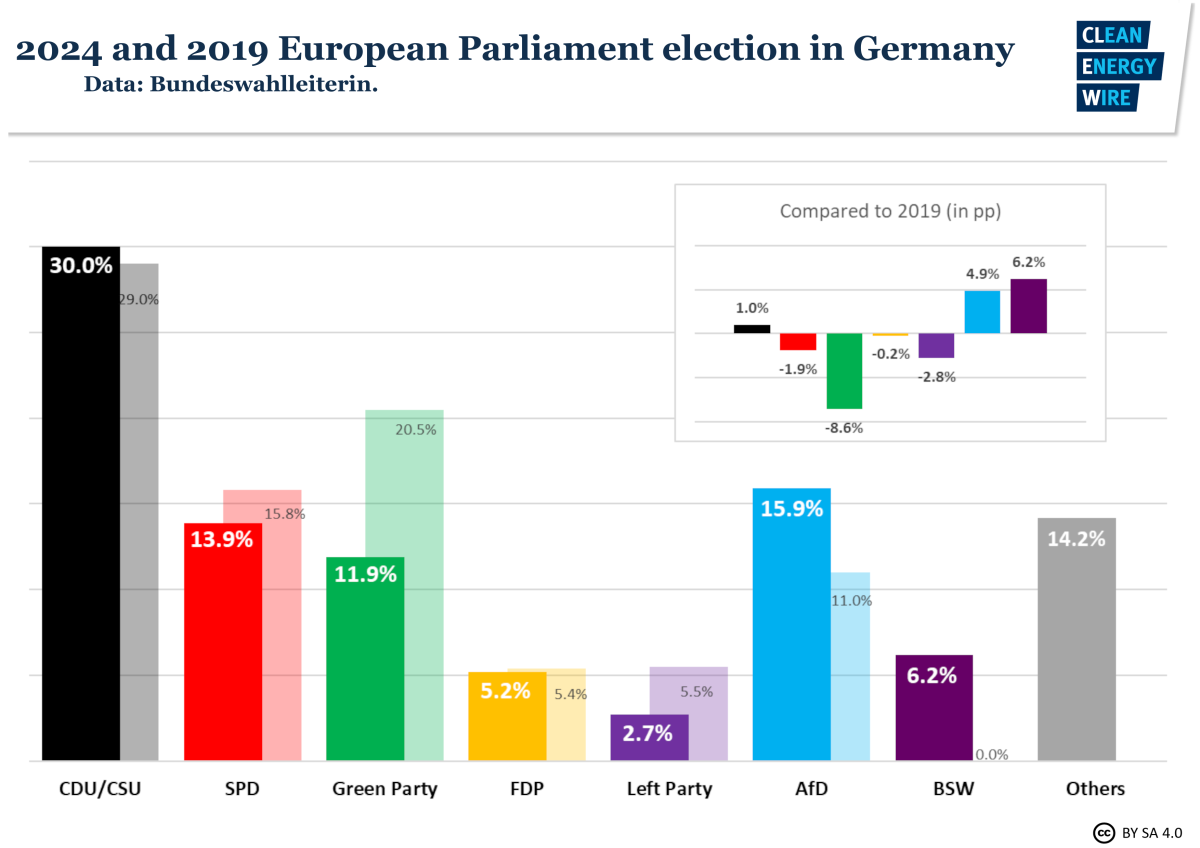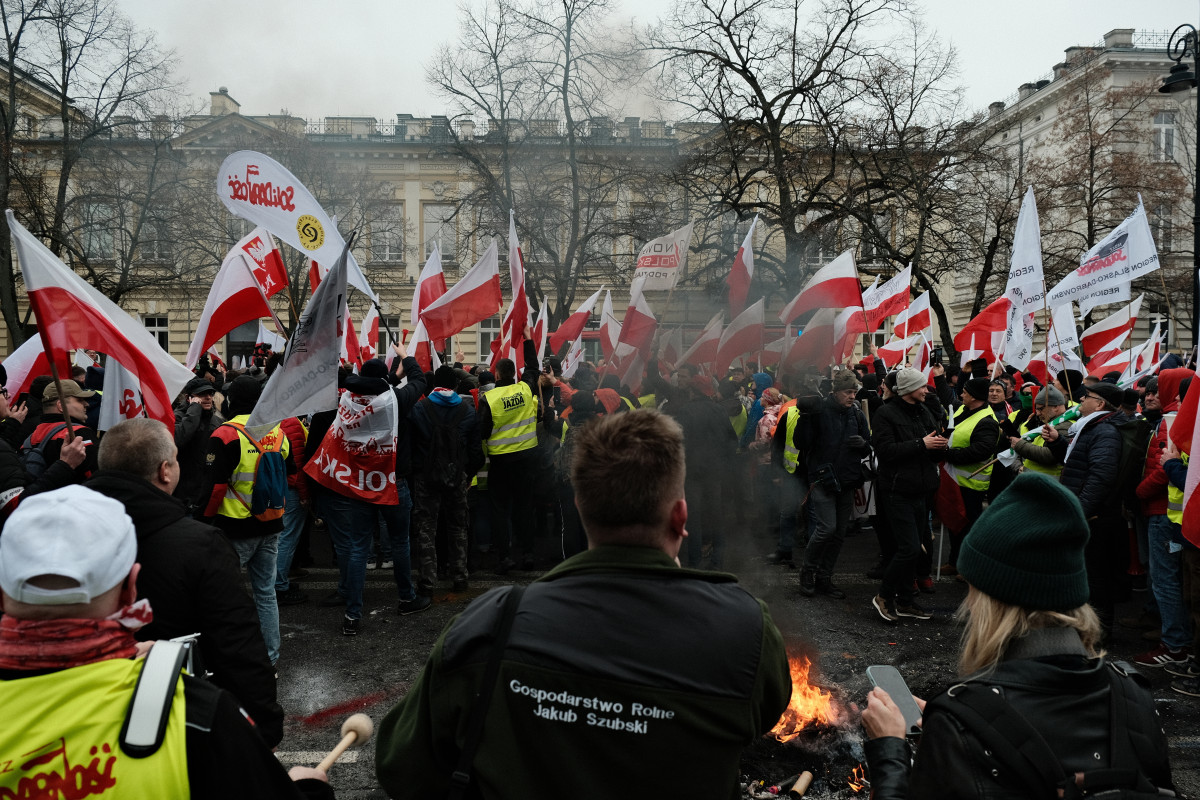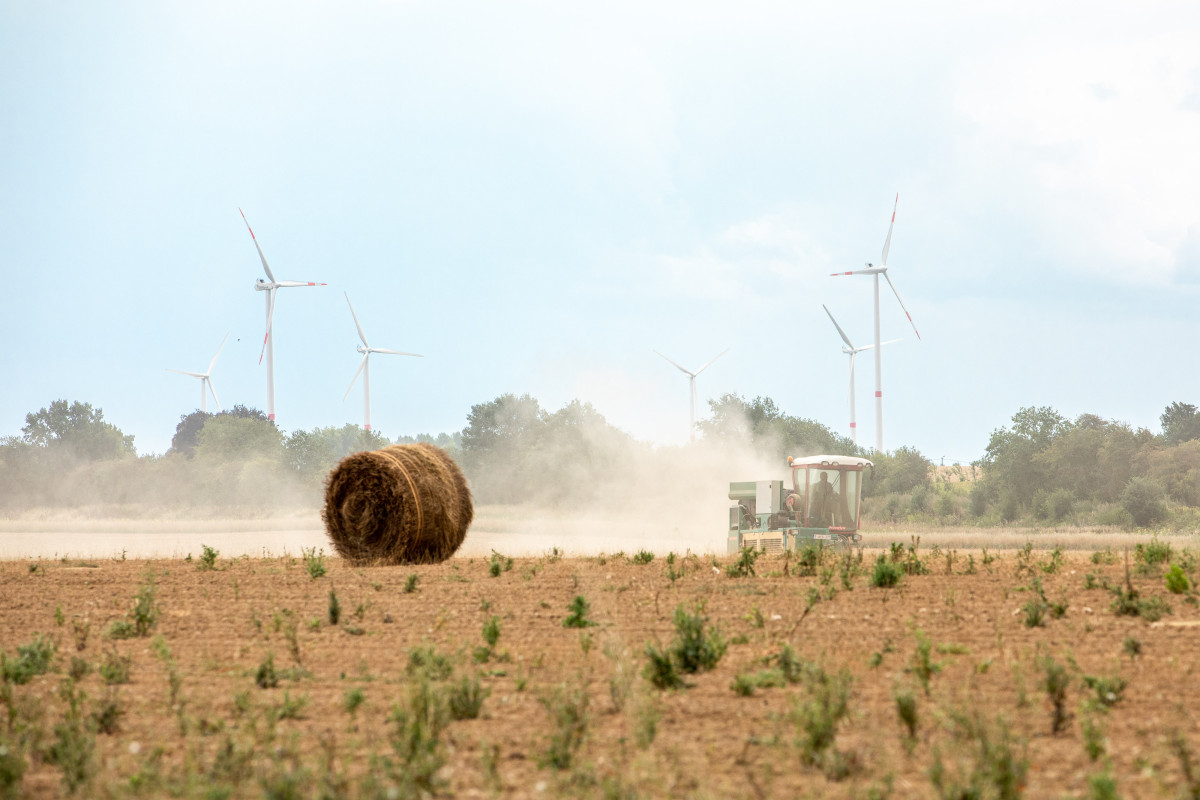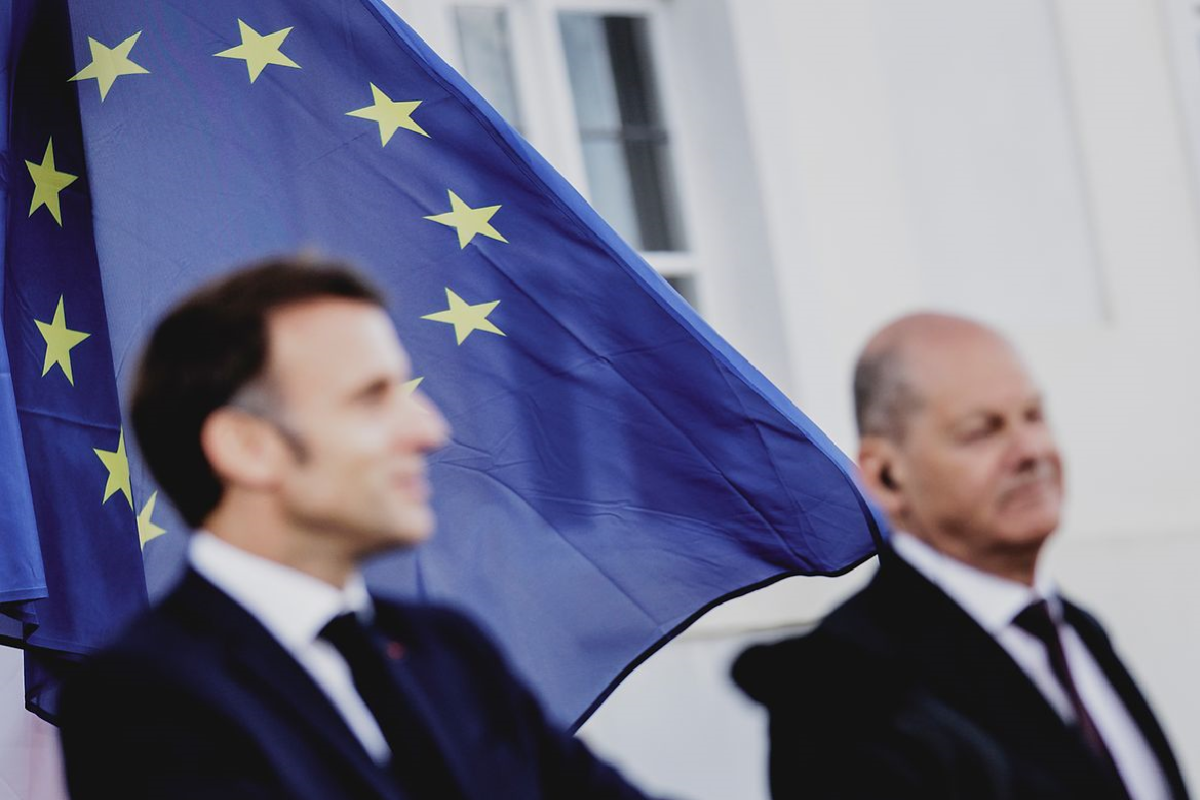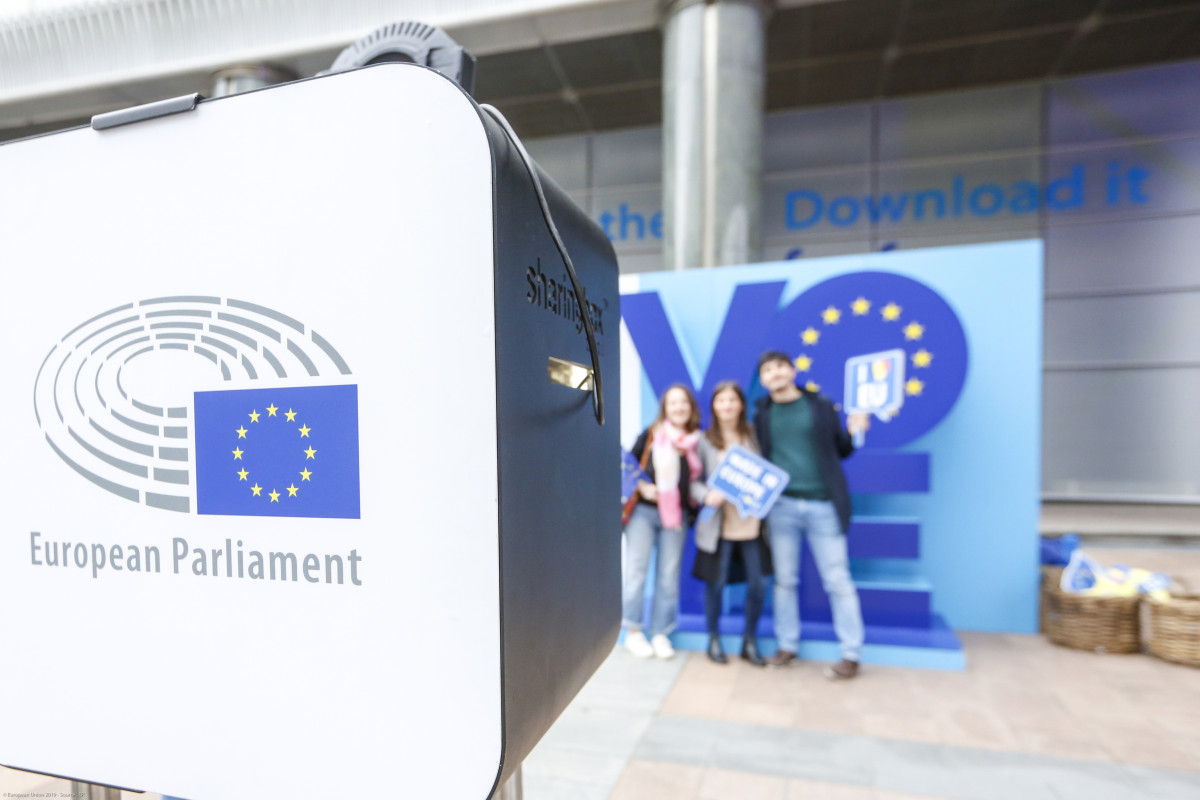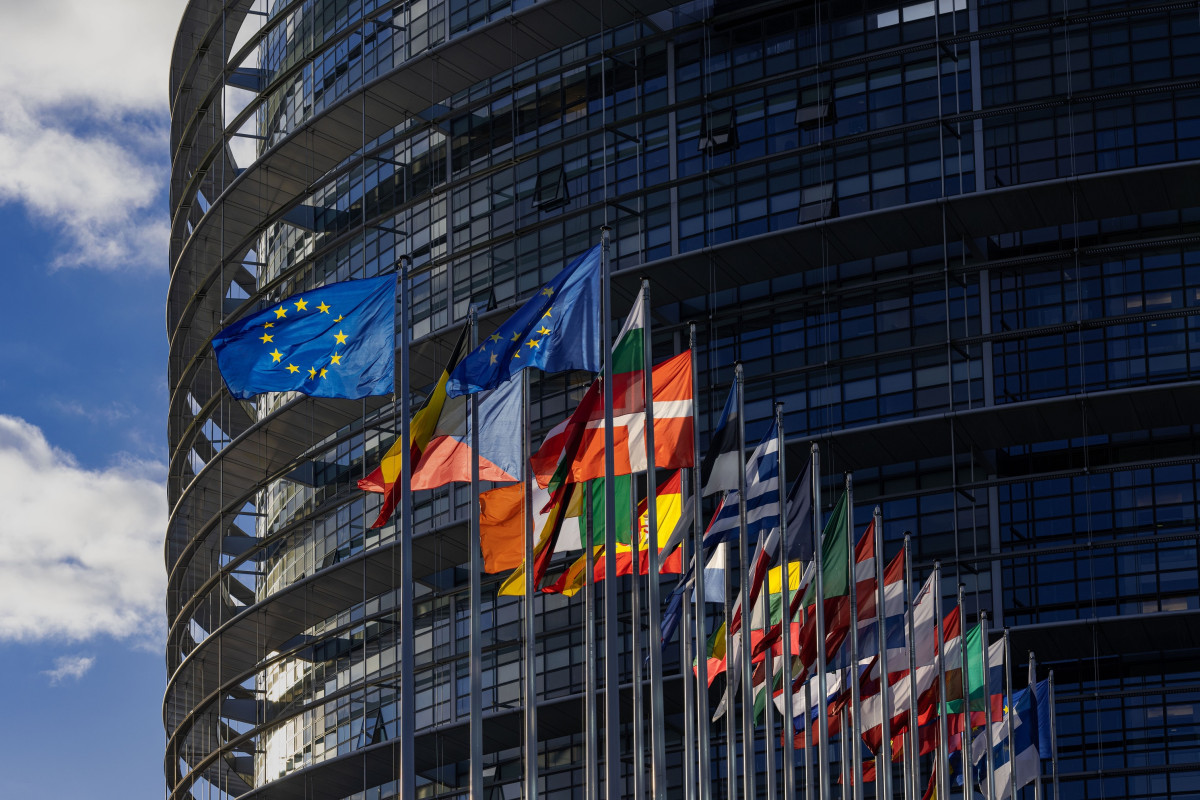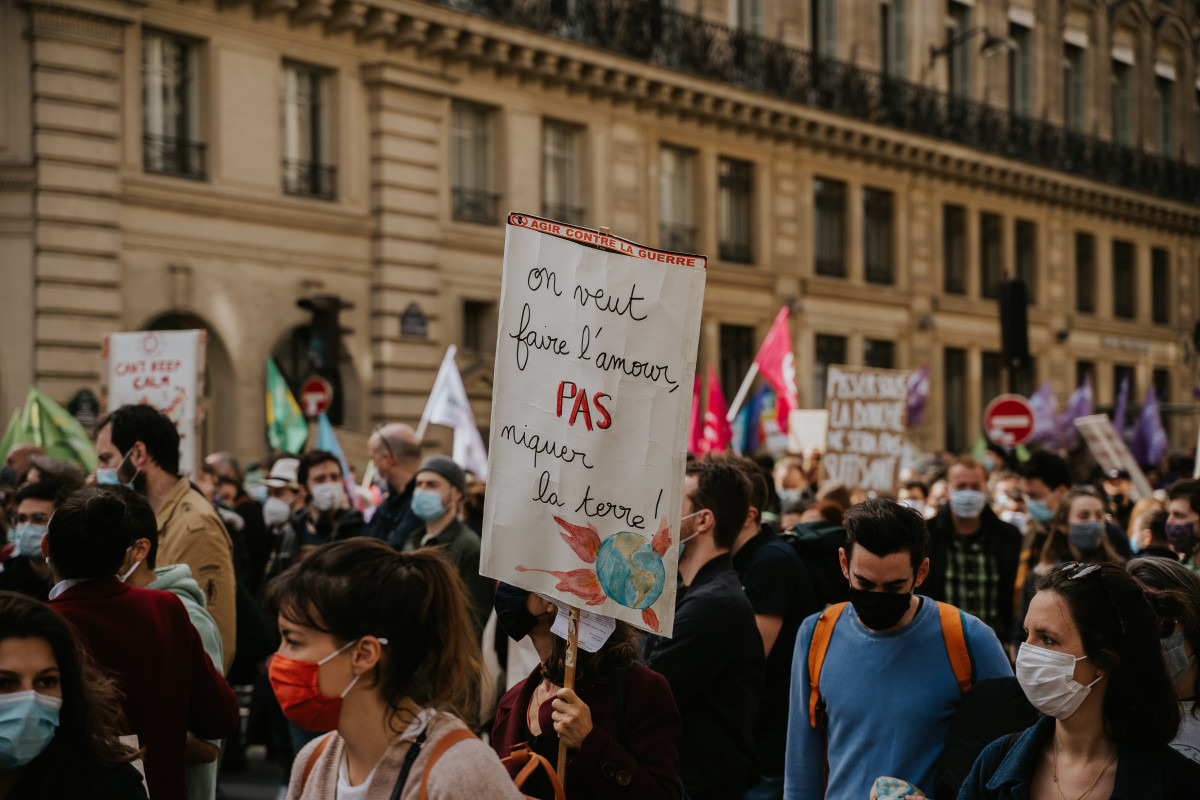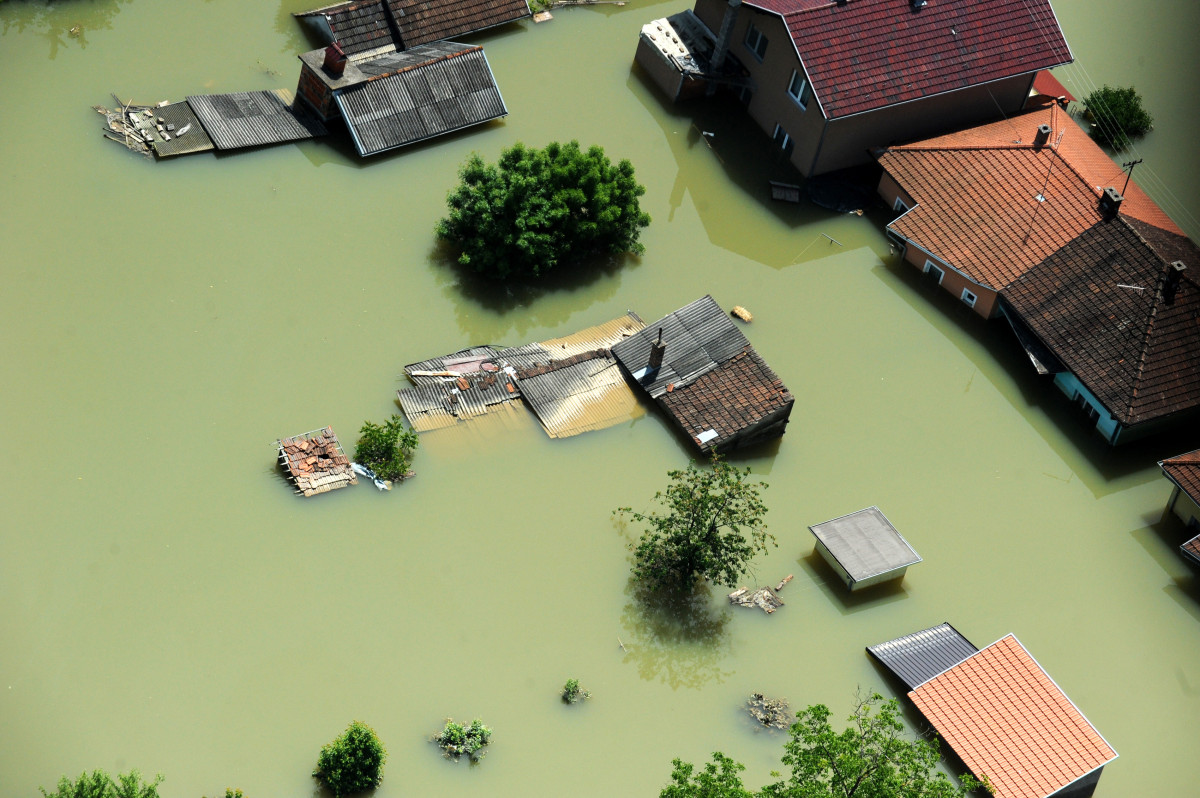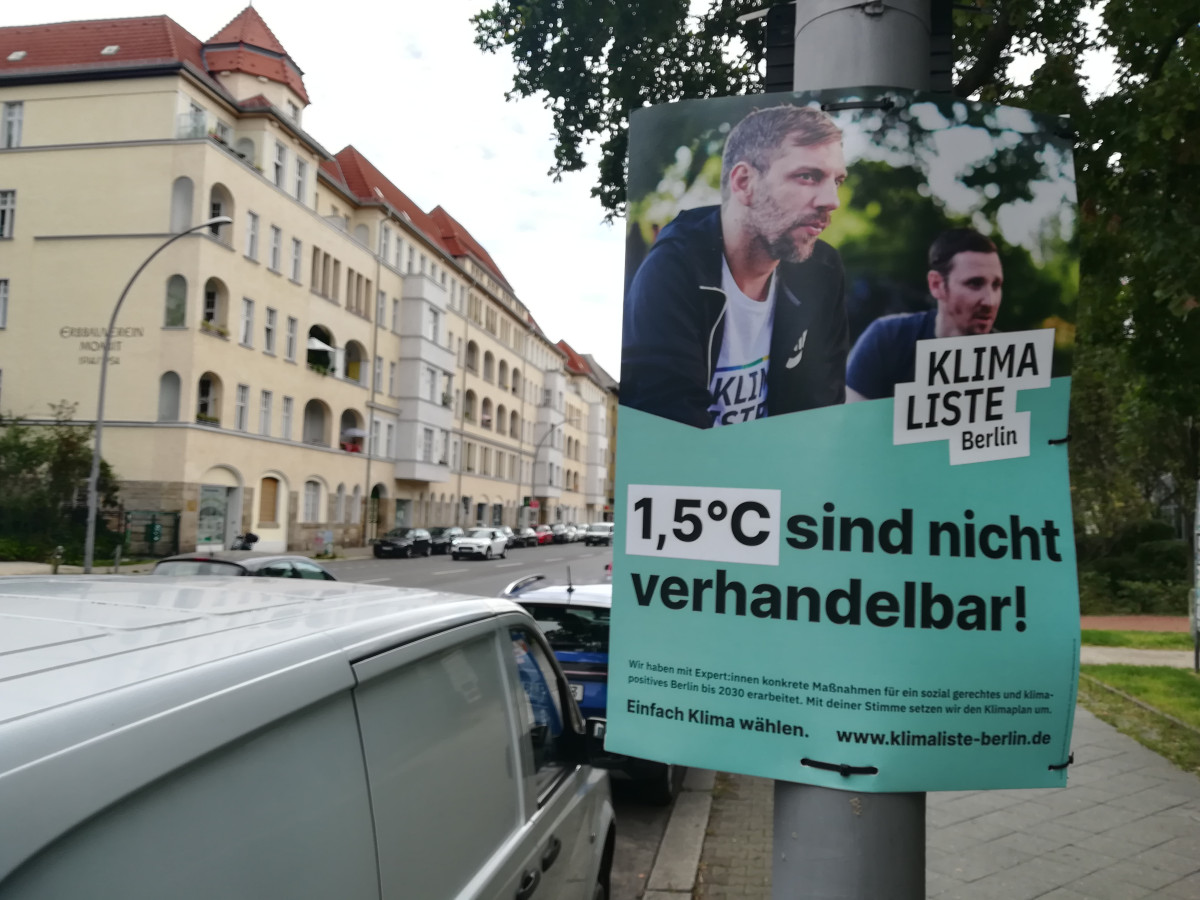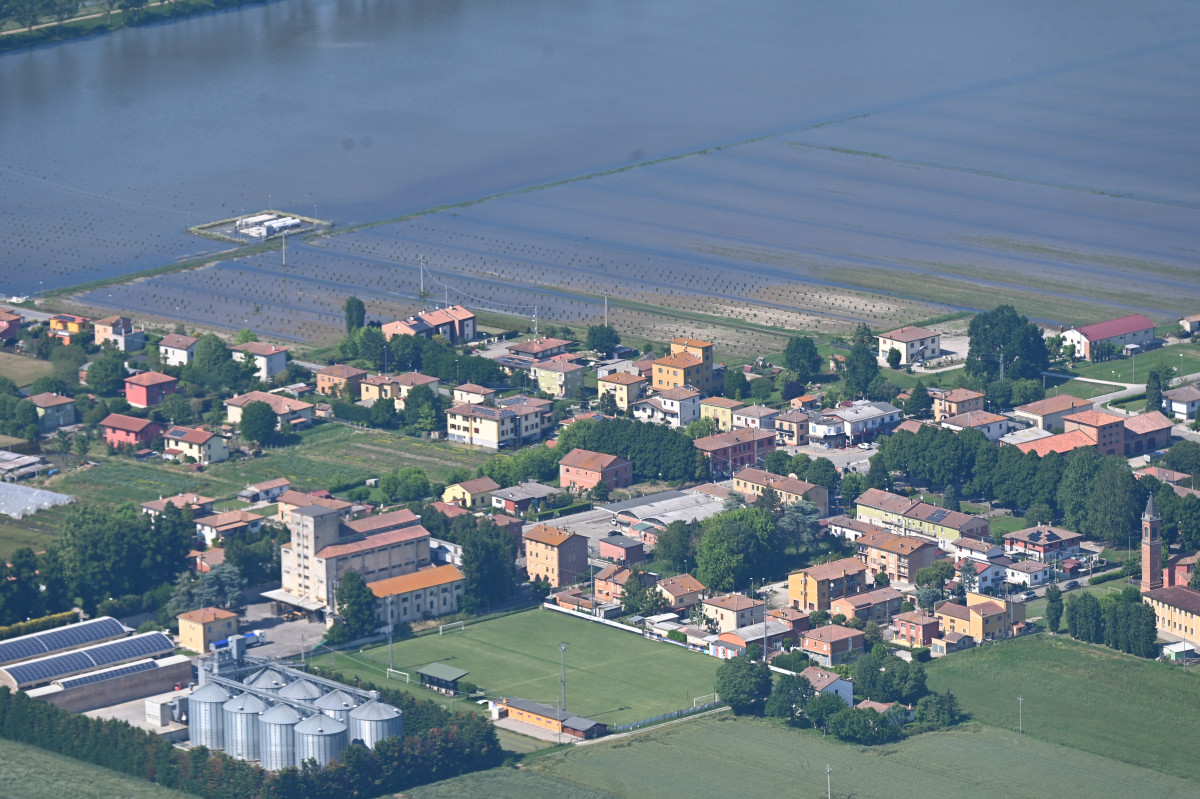Climate and energy high on the agenda in 2024 EU parliament elections
- Contents
- EU election defeat bodes ill for German govt’s climate ambitions ahead of state votes
- Dossier: Populists in power: A challenge for ambitious EU climate policy
- Guide: Climate in the 2024 EU elections and the making of the bloc’s next leadership
- Interview: EU elections will not trigger Green Deal rollback, but future ambition at stake – researcher
- Story: France and Germany sideline energy spat during state visit as far-right threat looms over EU elections
- Story: Preview 2024: Elections to shape future of European Green Deal
- Quarrelling German coalition treads lightly on climate as economy dominates EU election agenda
- Story: Cost of living fears set scene for tough climate debates a year before 2024 EU vote
- Q&A – French torn between energy price fears and climate threat a year before EU vote
- Q&A – Climate may get only sporadic attention as economy to dominate Croatia’s “super election year”
- Q&A – Germany faces heated debates over climate policy in 2024 EU election
- Q&A – Italy strives to become EU energy leader a year ahead of 2024 EU vote
Factsheets
- Climate in the 2024 EU elections and the making of the union’s next leadership
- Lack of coordination and monitoring slows climate adaptation in Poland
- Q&A: Making the EU’s electricity market fit for a climate-neutral future
- Greece must make up for lost time in climate adaptation
- Climate change adaptation plans fall short in hard-hit Italy
- Europe steps up climate change adaptation in wake of floods and heatwaves
- CLEW Guide – How the European Union is trying to legislate a path to net-zero
- CLEW Guide – Government turmoil casts doubt over France's transition progress
- CLEW Guide – Poland's new govt yet to deliver on energy transition promises
- CLEW Guide – Snap elections add new uncertainties to Germany's 2030 climate targets
- CLEW Guide – Italy moves on green transition, but fossil ties remain tight
- CLEW Guide – Croatia caught between LNG ambitions and abundant untapped renewable energy potential
EU election defeat bodes ill for German govt’s climate ambitions ahead of state votes
Voters in Germany abandoned the parties of Chancellor Olaf Scholz's coalition government in their droves at the European elections, handing the conservative CDU/CSU alliance of European Commission leader Ursula von der Leyen a clear lead. The vote also brought an unprecedented result for the far-right AfD in Germany, which came out as the second strongest party. The populist group even emerged as the strongest party in the country’s East, where a string of three state elections looks set to keep tensions in the three-way coalition high amid constant campaigning and difficult budget talks for 2025. The leaders of the Greens and of Scholz’s SPD already conceded the government had to take a critical look at itself – citing the country’s ill-designed heating law as an example of how not to do climate action which keeps people on board. Read the article here.
Dossier: Populists in power: A challenge for ambitious EU climate policy
Right-wing populist parties opposing strong climate action are gaining support in many EU countries and are expected to score well in the European Parliament elections in June. This has caused fears that these parties are increasingly exploiting divisive debates over climate action, pushing mainstream parties to tone down ambition, or that in countries where they are not in government they are seen as the most credible competitor. But how strong is the populists' impact on climate efforts in Europe and where is it felt most prominently? And how do societies and politicians react? This dossier sheds a light on how populist parties shape climate policy across Europe, with case studies from countries like Poland, Hungary, Spain, the Netherlands and Germany, and interviews and analyses. It will also assess the importance of a just transition to address people's concerns over climate action. Read the dossier here.
Guide: Climate in the 2024 EU elections and the making of the bloc’s next leadership
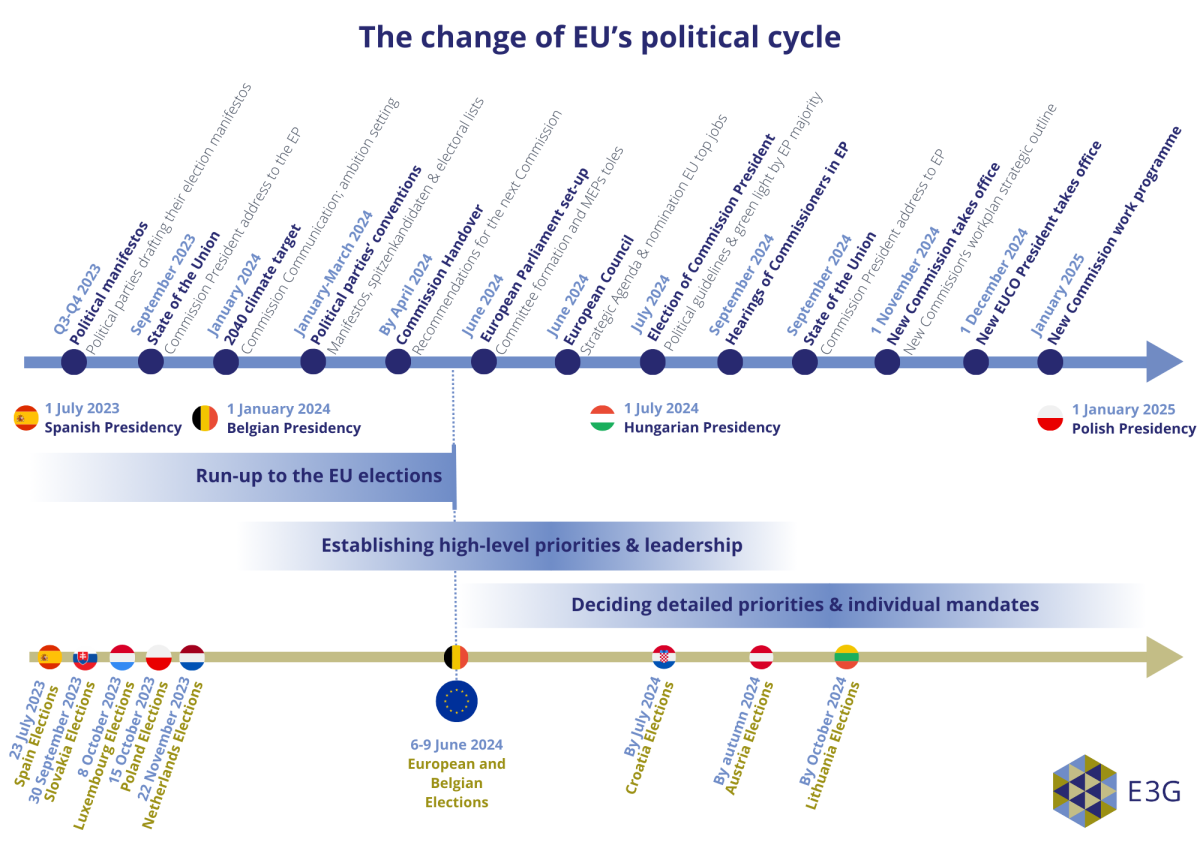
Voters in the EU will head to the polls on 6-9 June 2024 to elect the next European Parliament and help shape the bloc’s climate policy for the next five years. The months building up to the vote provide many opportunities for journalists to cover European energy and climate issues, and the election itself kicks off the long process of picking the bloc’s new leadership that will decide climate policy until the end of the decade. This factsheet explains the role of energy and climate in the EU election year, highlights key moments journalists should have an eye on, and provides expert contacts and resources. Read the factsheet here.
Interview: EU elections will not trigger Green Deal rollback, but future ambition at stake – researcher
The European Parliament elections this week (6-9 June) are unlikely to cause a big rollback of existing EU Green Deal legislation, but a projected shift to right-wing – and often climate action sceptic – parties could lower ambition going forward, researcher Philipp Jäger says. Still, in EU policymaking, the European Parliament is only one actor, with member state governments also playing an important role, especially as the union has turned its focus on implementing the agreed policies, Jäger says. That also means that the regional and local levels are increasingly important, and climate sceptic and populist parties there can hamper the rollout of needed implementation quite a lot, the policy fellow at the Jacques Delors Centre think tank says. Read the interview here.
Story: France and Germany sideline energy spat during state visit as far-right threat looms over EU elections
One year later than originally planned, French president Emmanuel Macron paid a three-day state visit to Germany that allowed him to reinforce calls for closer European cooperation in the week before the EU elections. Both Macron and German chancellor Olaf Scholz face assertive far-right parties that look set to go strong in the European vote, meaning the two embattled leaders must find a convincing joint vision for the next European Commission to salvage key policy achievements like the Green Deal. Unlike in the year before, energy policy has taken a backseat in government talks this time – but industry representatives say a common stance regarding the transition to climate neutrality will be vital for achieving their shared aim of a European industrial revival. Read the story here.
Story: Preview 2024: Elections to shape future of European Green Deal
Voters in the EU will head to the polls in June 2024 to elect the next European Parliament, kicking off a months-long process to pick the bloc’s new leadership that will shape climate policy until the end of the decade. It will face the difficult task of designing the follow-up to the Green Deal – Europe’s strategy to become the first climate-neutral continent by 2050. Policymakers say the EU must focus on implementation, but also ensure its place in the world as a climate and technology leader, even as increasing worries of losing out in the transition causes pushback against ambitious climate policy. The political landscape is set to change as far-right parties are projected to make significant gains in many countries. However, the example of Poland points in a different direction, where a new pro-European government promised to put forth an ambitious energy transition programme soon. Read the article here.
Quarrelling German coalition treads lightly on climate as economy dominates EU election agenda
The surge of populist parties that oppose ambitious climate policies has left its mark on Germany’s national debate as it did in many other European countries ahead of the upcoming EU elections. Fearful of the backlash against the costs of decarbonisation and transformation, as exemplified by farmers’ protest in early 2024, mainstream parties from the governing coalition and the opposition are focusing on managing social conflicts or reversing regulations seen as obstacles to industrial recovery. But debates about austerity and tactical manoeuvreing by the government and opposition parties may complicate this task. Read the story here.
Story: Cost of living fears set scene for tough climate debates a year before 2024 EU vote
With its Green Deal strategy to make Europe climate neutral by 2050, the outgoing EU executive has reiterated the climate leadership role of the 27-member union. However, as citizens increasingly feel that the changes needed to avert the worst effects of climate change influence their day-to-day lives, climate policy has become more politicised and is set to play a major role in the 2024 election campaigns across the EU. After more than a year of fighting in Ukraine, Europe is still struggling with the consequences of the energy crisis, where high prices put leaders under pressure to shield businesses and households. Analysts say there is a chance that recent crises, including the coronavirus pandemic, could lead to a more Europeanised election campaign, usually driven by national issues in the member states. Read the article here.
Q&A – French torn between energy price fears and climate threat a year before EU vote
One year from now, French citizens will go to the polls to have their say in the makeup of the European Parliament, together with citizens from across the EU. Energy and climate policy could play a decisive role in the elections, as high energy bills are likely to stay whilst the war in Ukraine rages on, and environmental activists are taking the streets to push the government toward rapid decarbonisation. For the French, fears of high bills on the one hand and scorching heatwaves on the other will influence their choice. Commentators expect the European elections to look much like a national political debate ahead of the next presidential election in France. Polls suggest that the current government could again land behind right-wing nationalists as in the 2019 European vote. Read the Q&A here.
Q&A – Climate may get only sporadic attention as economy to dominate Croatia’s “super election year”
The 2024 European Parliamentary elections will kick off what has been coined a “super election year” for Croatia, together with parliamentary and presidential votes later in the year. Political analysts expect heated debate as politicians will focus on issues such as how to deal with rising costs of living also due to recently high energy prices. Climate change is less likely to be a stand-alone topic in the election campaigns. It garners only sporadic attention in both the media and politics, usually when the country is faced with extreme weather events. Read the Q&A here.
Q&A – Germany faces heated debates over climate policy in 2024 EU election
Voters in Germany, alongside other EU citizens, will head to the polls one year from now to elect a new European Parliament and lay the groundwork for the next European Union executive to shape energy and climate policy for five years. Climate change was the top issue for German voters in the last European election in 2019, following summer heatwaves and a series of powerful protests by Fridays for Future student activists. June 2024, however, could see a different kind of “climate election”: many voters are more concerned about issues such as the cost-of-living crisis or security policy following Russia’s invasion of Ukraine. Intense public debates over a government proposal to effectively ban new oil and gas heaters showed that tensions may intensify as citizens see their daily lives increasingly affected by climate action. Regional elections in several eastern German states later in 2024, where populist and far-right parties have especially seized on people’s fears of change and high prices, may add to a tense environment. Read the Q&A here.
Q&A – Italy strives to become EU energy leader a year ahead of 2024 EU vote
In early June 2024, Italian citizens will head to the polls to elect their representatives in the European Parliament, along with the other member states. Public debate remains fierce in lieu of continued inflation and energy woes, with surveys suggesting a higher turnout than last time. Concerns over the impacts of climate change have risen following one of the hottest and driest years on record, especially amongst the young, who are demanding faster and more ambitious action. Meanwhile, the sitting government, which took office less than a year ago, has repeatedly criticised European green transition plans, arguing that these could undermine Italian industry, even through it has shown continued support for European climate goals. Read the Q&A here.

